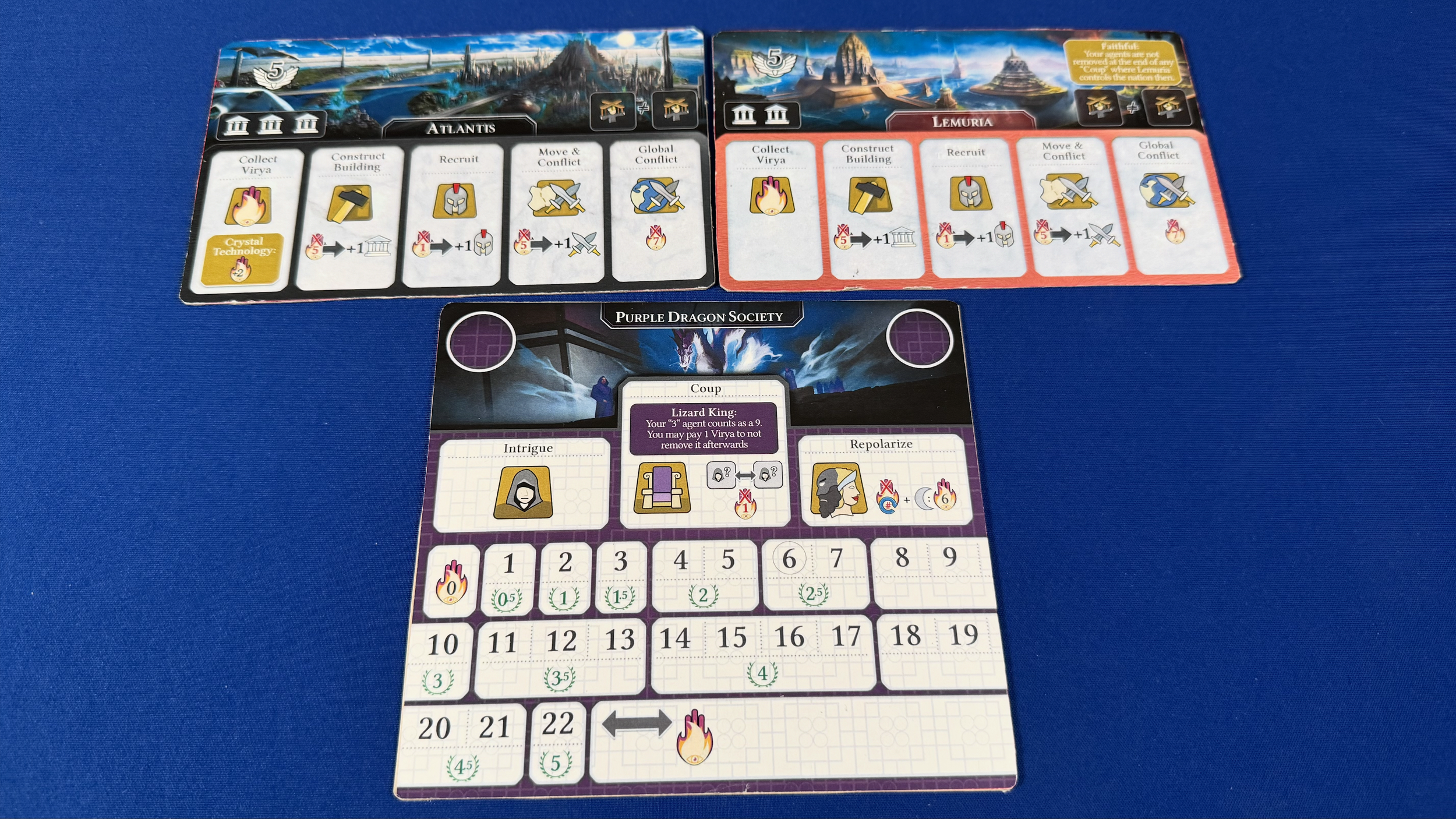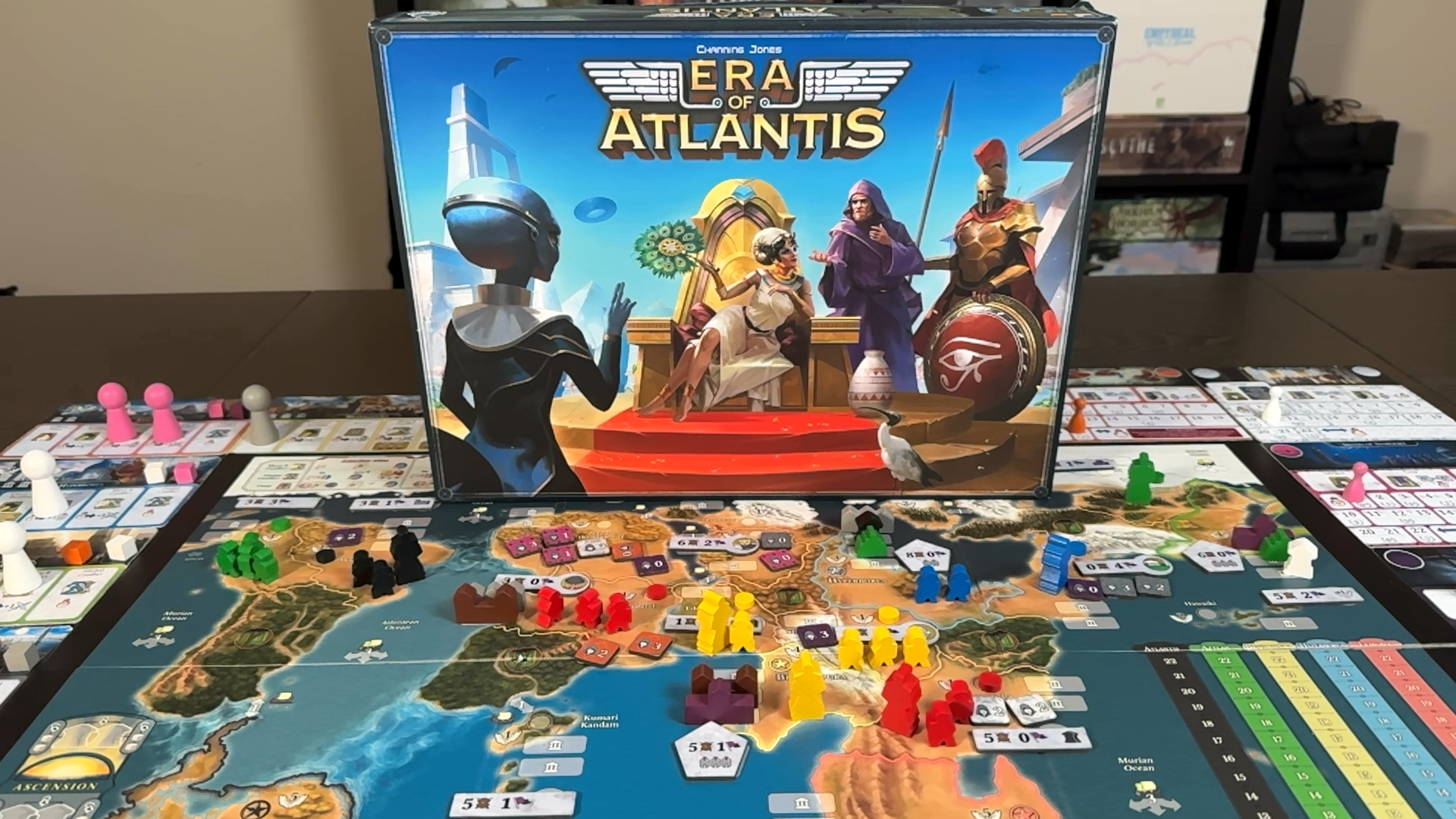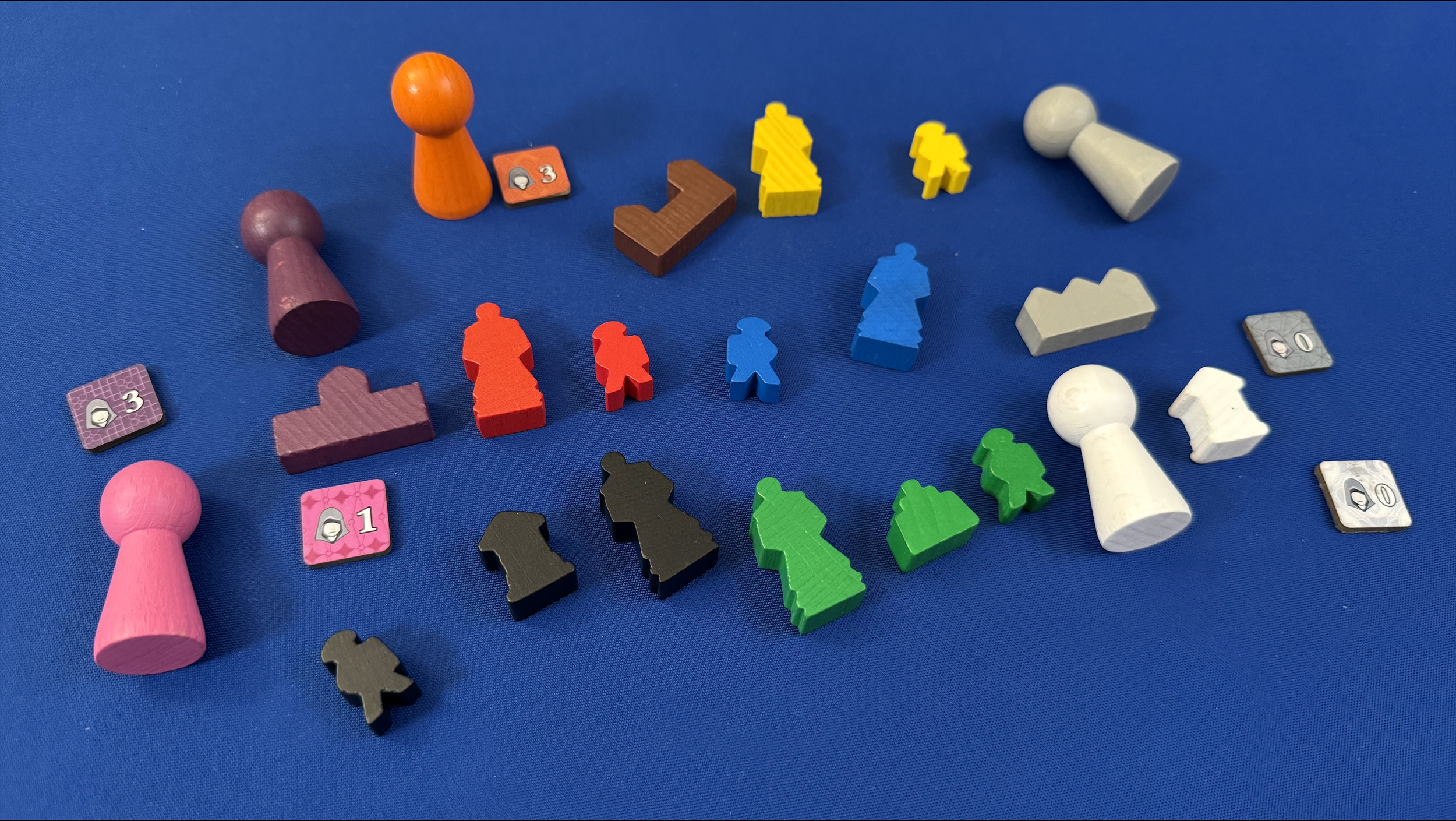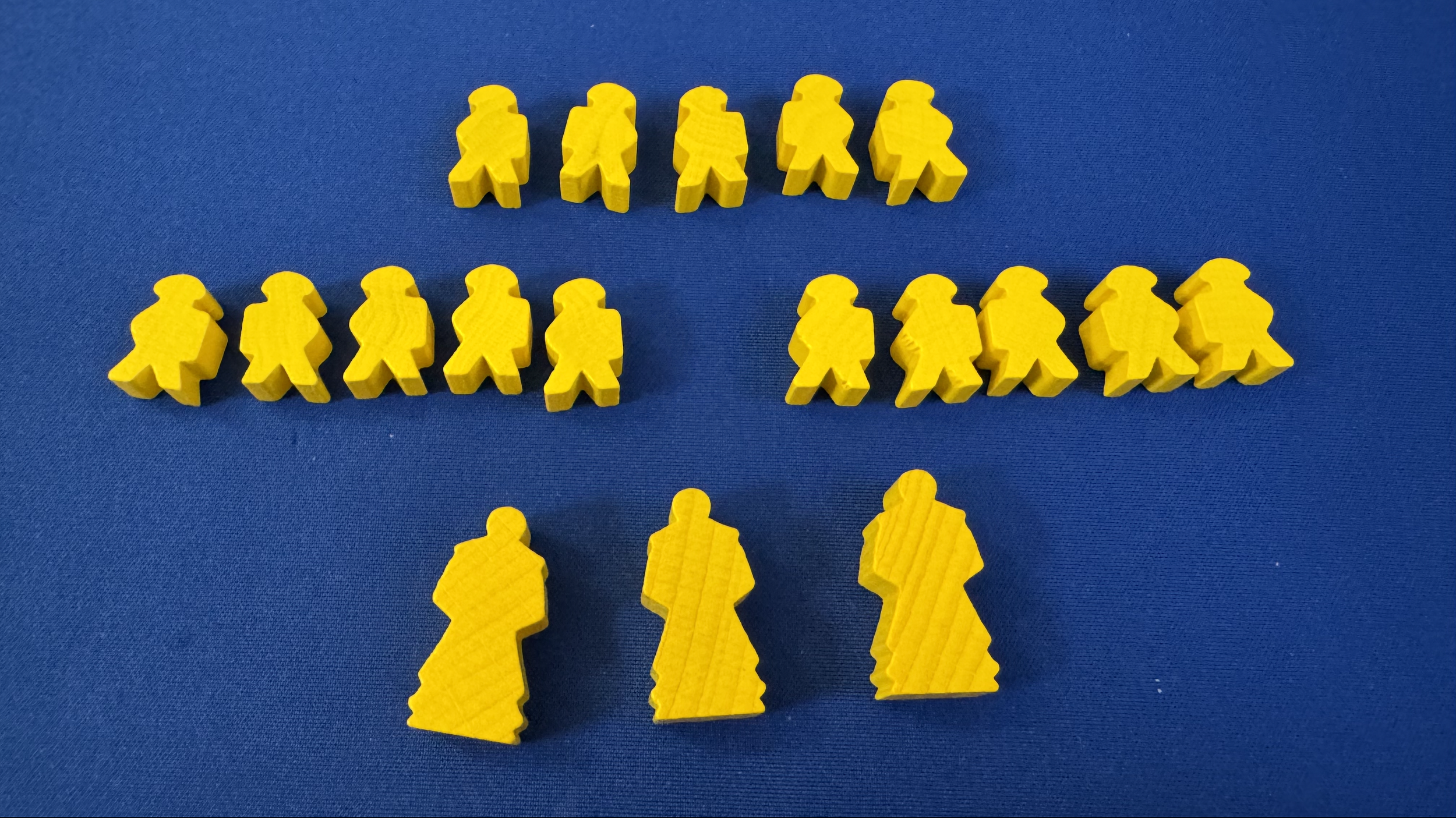Era of Atlantis Prototype Review
Area control with a twist! Control 2 nations, each sharing control with someone else!
At 2 hours for 2-5 players, Era of Atlantis has players puppeteer the world’s major nations against each other. Included with an introductory, standard, and advanced ruleset, players will participate in blind bidding combat with a surprising tangle of players being involved because of all the shared control! With 5 major nations and 5 secret societies to choose from, along with 14 unique special actions that can possibly be thrown into the mix, this low-no randomness area control offers bizarre yet incredibly thoughtful interactions that can be hard to fully grasp!
Video published September 24th, 2025
-

Pick a secret society!
-

Control 2 major nations…
-

But share them with other players!
Playtime: 5 times all at either 4/5 player, all using advanced rules.
Component Pros
Overall very readable despite how much info is conveyed with the messy overlapping control
particularly important that it’s easy to tell on a glance power levels and victory conditions like temples and round/doom track timer
Generally speaking game makes you have to move a directly related piece whenever you do any action
ingrains actions to memory well because often these will work similarly across different actions like moving white cubes to temple unlock track, and actions always use moving your action pawn
Iconography everywhere may not be immediately intuitive but a very good reminder once you learn the game
Special action tiles have icon and text version with different sides, great reverse-side usage
Dial different colored backs easy to identify different players bidding
Comprehensive player aids for everyone
different sides used at different points, not constantly flipping which is good
Overall, components of the prototype are pretty good, baseline is nailed, improvements at this point would be minor but still welcome, not in a concerning state
Gameplay Pros
Random setup variety huge deal for which major nations are prime targets for coup and global conflict
Tons of options because players can maneuver in all sorts of ways for points
must find which paths help others the least
Everything is relative, no point in full investment because you can swap ownership plus final major nation score is weaker of 2
Everything being interconnected causes ripple effects across players’ nations
can’t isolate must diplomacy because shared control and slow actions
hard to find the line that actually gives you more points, selfish actions rare and powerful
Interesting asymmetry, from things like possible ownership swaps, as well as potential synergies
Objectives provide interesting dynamics to motivations and partnerships
all have tradeoffs, like light may need wasting turns going into wilderness but gets late game benefit (yet even that benefit can be stolen if someone else builds the temples)
objective changing good implementation with cost increasing with time
Political and military different ways to control board, both are viable options
paying attention to bidding super important
agents doubting as map presence for bidding affects military too, different lanes but still affect each other
Actions costing extra virya is easy to remember, like extra attacks and buildings both cost 5
Component Cons
Rule for temples light/dark cant share space is in glossary not base rules
Player boards do their jobs well (would be shocked if that was messed up since it’s just actions and virya/points) but the compensation tiles are jank and everyone thinks they extend the tracker at all times
Too many colors actually, should use different shapes or icons at a certain point, red/pink/orange is confusing, white/grey/black too
clashes with buildings because shared colors, lost opportunity for immediate intuitiveness and readability
overall the board is something you really have to stare at for a bit to get a cohesive picture with all the shared colors and shared nations
would need, as an example, the military units having unique minis for each nation, and the puppet cubes were different minis/shapes for each secret society, that would help greatly assist the colors’ job
Concerned about less readability because of space taken with military units, thought it may be fine cause bigger board in final release so there’s more space, but instead of meeples they will be minis so space crammage still seems very real
not really a preemptive issue with control markers since obelisk is vertical and prominent, and won’t be out of the way like the prototype discs
Shouldn’t share so much visual aspects between different components like lost relics are cubes just like the ownership cubes just different size, should try to avoid overlap like that even if those components are usually far away from each other during gameplay
an example of doing this well is doom, round, and end round markers, imagine if they shared any shape or color would be so much worse
Slightly concerned for final product organization cause of all the token types and types of cards, not helped by the random stuff only used for lower player counts
Gameplay Cons
Why have giant minis worth 5 while also being component limited to 30 units max because if this is a conflict numbers balance concern, you already regularly go to values where it’s really hard for bids to meaningfully affect the result without losing like all your virya
why not design around uncapping the components by giving the military tokens with x5 they can stand on so that you don’t block certain distributions of territory held
Ocean move cost steep, usually makes you way too vulnerable to global conflict to lose chunks of units like that (UPDATED so you can pay virya too)
Extremely defense orientated in general cause nations have innate defensive bonuses, ocean movement punishing only furthers slower outreach
this is playing into trope of how area control games tend to have an issue with defaulting to deathballing if you need to insta win fights, so design has to come up with reasons to expand and stretch thin, but that’s only somewhat prevalent here since it’s totally fine to deathball every so often and only take like a couple minor nations, once you have a place it’s harder to dislodge due to aforementioned nation defense stats
Doesn’t seem like you would ever win by being the only person at table with an objective card of its type at higher player count
makes hard committing obj card kinda pointless should just strengthen your virya and nations
might be more of a 3p thing so there’s more to focus on since less table talking to do, not a huge deal once you know but initially misleading and not hugely concerning if core gameplay loops remains super engaging
Maybe all the defensive stalemating is fine though cause it does make every victory feel all the more meaningful, it’s just that it’s so common for newcomers to not know what to do once everything is developed cause it’s hard to recognize how even 1 point swings are a huge difference
not really full blown con cause game is designed around these systems after all
More legitimate con would be pacing issue cause this style of gameplay tends to work better for longer games since you can see more incremental gameplay develop
this game’s mesh of interactions with slow gradual progress feels weird for a 2 hour game doing only 1 thing a turn, turns and combat needs more liquidity/velocity cause right now too much is built on established foundations so if you fall behind your actions will be significantly weaker
that means being able to go into late game with super efficient actions is another motive to be hugely risk averse
Tentative Score - 8/10 Great!
Era of Atlantis does the whole secret society puppeteering nations things very well, with the mechanics leading to some of the most hilarious table banter I’ve ever seen thanks to everyone sharing control of their nations with someone else. Interesting aspects to talk about when negotiating with other players are always a plus in area control games, and it’s not like this game drops the ball when it comes to mechanics either, with crunchy turn planning to optimize getting the most power and virya out of your actions (just remember that any “plan” has to go through both your partners, who in turn may be influenced by their partners too).
The unfortunate part of this incredibly unique design then, is the jank and obtuse nature of what you’re doing. Because every nation is owned by 2 people, it’s never straightforward when looking at the map who owns what at a glance, as you always have to mentally untangle the clutter when thinking through what to do. Sure everything is color coded, but because there’s only so many colors, plus the fact that the colors aren’t necessarily unique, means they aren’t going to be immediately discernible. This isn’t something that’s gonna have an easy fix, and will likely remain as an inherent con that’s just gonna have to be a part of this incredibly unique design.
Definitely a weirder, more niche title for people who love super unique mechanics and less amenities designed into their board games. Era of Atlantis is incredibly novel and executes its fresh design ideas super well, and is absolutely a concept that we’d like to see explored more in other area control games looking to spice up their diplomacy. Definitely check this title out on gamefound https://gamefound.com/en/projects/channing-jones-seajay-games/era-of-atlantis if you’re pulled in by low-no randomness, blind bidding combat, and shared nation control!














